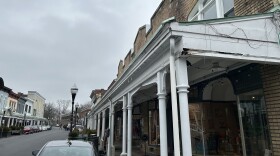Through a Freedom of Information Law request, attorney William Hurst says he obtained a chain of emails and a letter that Kingston Planning Director Suzanne Cahill sent the New York State Historic Preservation Office last year. Hurst represents William Gottlieb Real Estate, which has filed multiple lawsuits opposing the demolition plans.
The letter, which is dated February 2011, looks like it’s from the State Historic Preservation Office. It’s signed by an “Acting Commissioner Jonathan Sanford” who calls the Pike Plan a “blight” on the historic integrity of Kingston and praises the city for considering its removal. Cahill sent a copy of the letter to the state office via email last March, asking if it still agreed with Sanford’s opinion. The state office responded over a week later: “This 2011 letter appears to be fake; the letterhead, agency name, address, and Commissioner are all incorrect.”
Hurst says this is an example of Kingston trying to trick the state into saying it supports the Pike Plan's demolition before plans were officially announced a month later.
“It appears that the city is sending this document to the State Historic Preservation Office in order to sort of grease the skids for that announcement to follow," says Hurst.
Mayor Noble, a Democrat, says the Pike Plan is beyond repair and serves as an unwanted reminder of the Urban Renewal era in Kingston. He wanted to start demolition this April, and the city council voted to spend $1.2 million on the job. A New York appeals court recently paused the demolition until at least August, as it works through an appeal of one of William Gottlieb Real Estate’s lawsuits.
Speaking with WAMC, Noble defended Cahill and other city employees. He says Cahill sent the letter solely to verify its authenticity.
“When we went through all of the Pike Plan boxes last year, and we found this letter sitting in a file, we said, ‘Let’s check with the state to see if this information is still valid,'" Noble explains. "It’s obviously very old…the dates on that letter, if you look at the date, we were already starting the construction on the new renovations [in February 2011]. So to get a letter from the state at that time, something wasn’t jiving, and that’s why we wanted to check with the state."
“This didn’t appear to be just a lone city employee making a good-faith inquiry," Hurst refutes. "The letter was copied to the mayor and the city’s chief lawyer. And obviously if either of them had read the letter, presumably they did, they would have known immediately that it was inauthentic.”
In the email chain, after the state asked Cahill about the letter's origins, Cahill said: “The communication was found in file, and I think it may have just been a file which was transferred over with the changing of an administration. I honestly had never seen it until it was recently shared with me.”
After Noble announced plans to demolish the Pike Plan a month later, Cahill sent another email to the state, saying: “I was not aware that this was in the works.”
Noble says the fake letter could have been forged by a resident and submitted to the city back in 2011, during another contentious period for the Pike Plan. The city was weighing whether to tear it down, but decided to renovate it instead — a rebuild that, Noble says, didn’t help much in the end.
“Since then, many other sections have temporary bracing. We have had many studies that show structural issues," he adds. "We are not doing this for vanity’s sake. We are doing this because our engineers tell us they need to be removed.”
Noble says property owners can rebuild their own canopies after the demolition, but he doesn’t want the city to be responsible for them. Noble has said rebuilding the Pike Plan would cost around $10 million, and maintaining it would cost $150,000 a year.
William Gottlieb Real Estate owns some of the properties on Wall and North Front Streets. Its lawsuits claim the canopies are permanent “fixtures” that belong to the buildings they’re attached to, but that the city was responsible for maintaining them. It also claims the Pike Plan is historically significant. The Kingston Historic Landmarks Preservation Commission rejected that last year, but the State Historic Preservation Office deemed it eligible for the state and national registers.
Noble says being “eligible” doesn’t make it a historic landmark.
“Everything’s eligible if it’s over 50 years old, but whether it actually could ever be listed as historic is a very, very high bar to reach," he notes.
Noble says William Gottlieb Real Estate is trying to bury the city in litigation and FOIL requests, and that the lawsuits have cost Kingston “hundreds of thousands of dollars.” It’s not the only issue they’ve gone to battle over: Noble says William Gottlieb Real Estate sued the city more than 20 times over the proposed Kingstonian development in the city’s uptown.
Hurst says he doesn’t plan to launch any new lawsuits with this documentation. He just wants people to know about it.
“I think that it’s a matter now of public integrity," says Hurst. "And just explaining why this false document is in the City of Kingston’s files and being advanced to state agencies without anyone picking up on it in the first place, or investigating it after it was revealed to be fake."





